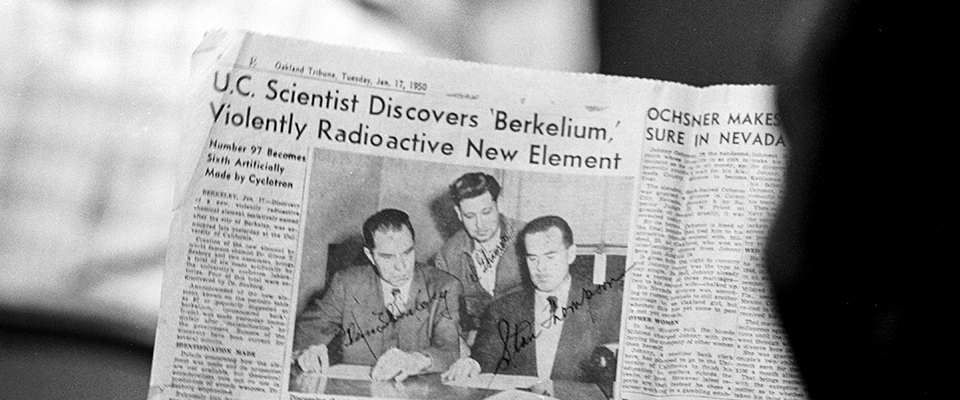The world of UC Berkeley and Berkeley in the world
I like to say this magazine is about two things: It’s about the world of UC Berkeley, and it’s about Berkeley in the world. Which is to say, it’s about Cal and its outsize influence on our culture, human knowledge, and global affairs. Our mission, as I see it, is to create a publication anyone would want to read, no matter where they went to school. If you graduated from Cal, we want you to be proud that this is your magazine. If you didn’t and you stumble upon a copy, we want you to wish you had.
I’m pretty confident this issue accomplishes those goals. Who wouldn’t be proud to hail from the university that discovered more elements than any other?
You do know about berkelium, right? Did you ever hear of Stanfordium? Oxfordium? Caltechium? No, you didn’t. Because they don’t exist. The 150-year-old Periodic Table of Elements is the subject of Barry Bergman’s article in this issue (“Period Piece”). If chemistry’s not your thing, don’t worry—Barry keeps it light as helium. As does Coby McDonald, in his story about Berkeley mathematicians and their favorite tool, Hagoromo chalk. Read his piece, “The Chalk Market,” here.
I spoke above of human knowledge, which may soon increase by leaps and bounds thanks to nonhuman brainpower, or artificial intelligence (AI). Berkeley computer scientist Stuart Russell is one of those warning of the potential dangers of AI. As he tells the magazine’s Leah Worthington (“Race Against the Machine”), the AI future is, in significant ways, already here. He points to social media and the algorithms that feed us content and that “are trying to maximize some measurement of financial reward or click-through. And in order to do that, they learned by a very simple process how to manipulate human beings and change the kind of person you are so that you become more predictable in your clicking behavior. … So how do they make you predictable? Well, it turns out, by making you more extreme in your views. Many of these algorithms have turned hundreds of millions of people into more extreme versions of themselves.”
Unease about the rise of such algorithms also finds expression in Cal alum Jenny Odell’s new book, How to Do Nothing, which, as you might imagine, is not really a how-to book at all. Rather, writes contributor Nina Aron, “The book is a battle hymn for reclaiming our complicated, ever-changing selves: ‘I am not an avatar, a set of preferences,’ Odell writes. ‘I am lumpy and porous, I’m an animal, I hurt sometimes, and I’m different one day to the next.’”
From rebellion against machines, we go to rebellion against corporations with Chauncey Hare’s chilling photos of office life, now archived at the Bancroft Library. Hare was a resolute but quiet dissenter, Bartleby with a Leica.
Our cover model, former Cal track star Alysia Montaño, is equally resolute, but not so quiet. She made serious waves last May in a defiant op-ed in The New York Times that called out shoe companies like Nike (her erstwhile sponsor) for treating pregnancy like an injury, even as they touted inspirational slogans and ran ad campaigns featuring female sports icons and rebels like Colin Kaepernick. You can read Laura Smith’s profile of Montaño (“When Your Body Is Your Business”) here.
As an outspoken athlete, Montaño is a leader, no doubt, but also part of a tradition at Cal that goes back to Berkeley legends like Helen Wills, the Wimbledon champion who played and won a “Battle of the Sexes” 40 years before Billie Jean King beat Bobby Riggs, and Cal quarterback Joe Kapp, who, in the 1970s, single-handedly sued the NFL on antitrust grounds and won.
Athletes are held to a double standard, and female athletes perhaps doubly so. We want them to be role models, but when they take a strong stance as citizens, or even just stand up for their own best interests, they are often accused of being out of bounds. But this is a generation of athletes not inclined to “shut up and dribble,” and a generation of women who are fed up with male privilege. That a former Cal athlete is leading the charge on both fronts should come as no surprise to anyone.
As always, your thoughts and feedback on the issue are welcome. Send email to californiamag@alumni.berkeley.edu.


















